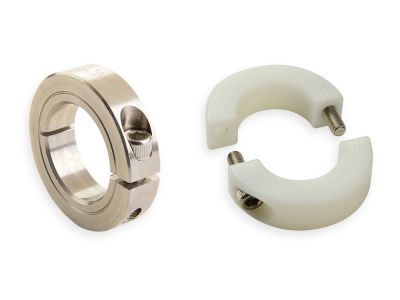Ruland Clamp Style Shaft Collars Offer High Holding Power
Ruland manufactures clamp style shaft collars with high holding power, fine finishes, and precise face to bore perpendicularity. They are commonly used for guiding, spacing, stopping, mounting, and component alignment on food processing, packaging, and handling equipment.
Food equipment manufacturers benefit from the tightly controlled face to bore perpendicularity of Ruland shaft collars (TIR of ≤ .002" or .05 mm) which is critical when they are used as a load bearing face or for aligning components such as bearings or gears. All Ruland shaft collars are machined to a fine burr free finish that reduces places for bacteria to be trapped and complements or enhances the appearance of food processing equipment. They are manufactured from solid bar stock that is sourced exclusively from North American mills.
Clamp style shaft collars do not mar the shaft, have high holding power, and allow for simple positioning adjustments. They distribute compressive forces evenly around the shaft for a tight fit and improved holding power when compared to set screw collars. Two-piece styles offer in-place installation and disassembly, increased holding power, and are mated throughout the manufacturing to ensure proper fit and alignment. The Ruland name and bore size are stamped on every shaft collar for ease of identification.
Ruland shaft collars are supplied with fastening hardware that tests beyond industry standards for maximum torque capabilities and holding power. Shaft collars made from 303 and 316 stainless steel utilize hardware of like material for consistent corrosion resistance and to meet regulatory standards. All stainless steel hardware undergoes an in-house surface treatment process to prevent galling. Delrin or plastic shaft collars can be used as a cost effective alternative to stainless steel at the expense of performance. They are supplied with stainless steel hardware for corrosion resistance.
Patented hygienic clamping assemblies eliminate traditional shaft collar hot spots such as screw pockets, saw cuts, and surface imperfections where bacteria can buildup and transfer into the system. They are designed for corrosive high pressure washdown environments and provide a smooth uninterrupted surface for easy cleaning, making them a more hygienic alternative to standard shaft collars.





 Power Transmission Engineering is THE magazine of mechanical components. PTE is written for engineers and maintenance pros who specify, purchase and use gears, gear drives, bearings, motors, couplings, clutches, lubrication, seals and all other types of mechanical power transmission and motion control components.
Power Transmission Engineering is THE magazine of mechanical components. PTE is written for engineers and maintenance pros who specify, purchase and use gears, gear drives, bearings, motors, couplings, clutches, lubrication, seals and all other types of mechanical power transmission and motion control components.